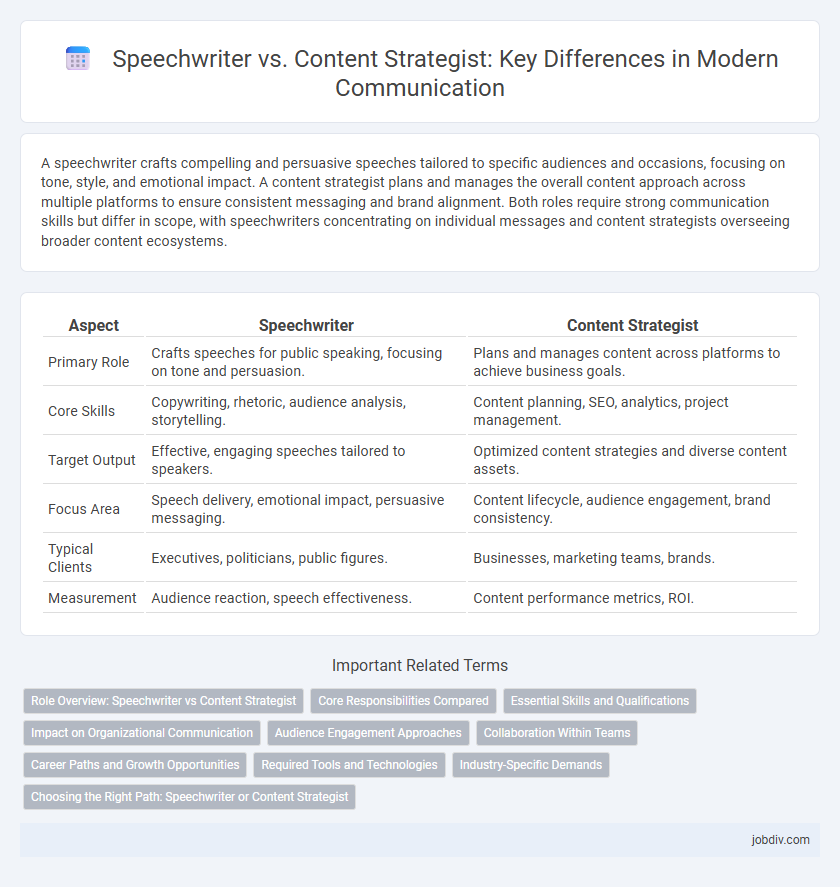A speechwriter crafts compelling and persuasive speeches tailored to specific audiences and occasions, focusing on tone, style, and emotional impact. A content strategist plans and manages the overall content approach across multiple platforms to ensure consistent messaging and brand alignment. Both roles require strong communication skills but differ in scope, with speechwriters concentrating on individual messages and content strategists overseeing broader content ecosystems.
Table of Comparison
| Aspect | Speechwriter | Content Strategist |
|---|---|---|
| Primary Role | Crafts speeches for public speaking, focusing on tone and persuasion. | Plans and manages content across platforms to achieve business goals. |
| Core Skills | Copywriting, rhetoric, audience analysis, storytelling. | Content planning, SEO, analytics, project management. |
| Target Output | Effective, engaging speeches tailored to speakers. | Optimized content strategies and diverse content assets. |
| Focus Area | Speech delivery, emotional impact, persuasive messaging. | Content lifecycle, audience engagement, brand consistency. |
| Typical Clients | Executives, politicians, public figures. | Businesses, marketing teams, brands. |
| Measurement | Audience reaction, speech effectiveness. | Content performance metrics, ROI. |
Role Overview: Speechwriter vs Content Strategist
A speechwriter crafts persuasive and impactful speeches tailored to specific audiences, emphasizing tone, style, and speaker personality to enhance oral communication. A content strategist plans, develops, and manages digital content aligned with brand objectives and audience engagement, focusing on multi-channel distribution and SEO optimization. Both roles require strong narrative skills, but speechwriters prioritize spoken content, while content strategists oversee comprehensive content ecosystems.
Core Responsibilities Compared
Speechwriters craft tailored speeches by researching audience demographics and key messages, focusing on tone, style, and emotional impact to enhance speaker credibility. Content strategists develop comprehensive content plans that align with brand goals, audience needs, and distribution channels, emphasizing SEO, content calendar management, and performance analytics. Both roles require deep audience understanding, yet speechwriters prioritize persuasive spoken language while content strategists manage multi-platform content ecosystems to drive engagement.
Essential Skills and Qualifications
A Speechwriter must excel in persuasive writing, deep understanding of the speaker's voice, and the ability to craft compelling narratives tailored to diverse audiences. Content Strategists require strong analytical skills, expertise in SEO, and proficiency in developing comprehensive content plans that align with business goals. Both roles demand exceptional communication skills, creativity, and a keen sense of audience engagement to deliver impactful messages.
Impact on Organizational Communication
Speechwriters craft powerful, persuasive speeches that enhance organizational messaging by aligning tone and narrative with leadership goals. Content strategists develop comprehensive communication plans that ensure consistent messaging across multiple platforms, optimizing audience engagement and brand coherence. Together, these roles drive effective organizational communication by balancing compelling storytelling with strategic content distribution.
Audience Engagement Approaches
Speechwriters craft tailored narratives using rhetorical devices and emotional appeals to captivate live audiences during speeches or presentations. Content strategists analyze audience behavior and preferences through data-driven insights to develop multi-channel content plans that maximize digital engagement. Both roles prioritize audience connection but employ distinct methods: immediate emotional resonance versus sustained, targeted content distribution.
Collaboration Within Teams
Speechwriters and content strategists collaborate closely to align messaging with overall brand goals, ensuring consistent tone and purpose across communication channels. Speechwriters craft speeches tailored to specific audiences, while content strategists plan and manage content frameworks that support broader marketing and corporate objectives. Effective teamwork between these roles enhances clarity, engagement, and impact in both spoken and written communication.
Career Paths and Growth Opportunities
Speechwriters specialize in crafting persuasive, impactful speeches tailored for public figures, often working in political, corporate, or nonprofit sectors with opportunities to advance into senior communication roles or consultancy. Content strategists focus on planning, creating, and managing digital content across multiple platforms, driving brand engagement and SEO performance with career growth typically leading to senior marketing, digital strategy, or content director positions. Both career paths demand strong storytelling skills, but speechwriting leans more toward public speaking and influence, whereas content strategy emphasizes data-driven audience insights and multi-channel content optimization.
Required Tools and Technologies
Speechwriters rely heavily on advanced word processing software, speech drafting tools, and voice recording applications to refine tone and pace, ensuring persuasive and engaging speeches. Content strategists utilize content management systems (CMS), SEO analytics platforms, and social media management tools to optimize content distribution, audience targeting, and performance tracking across multiple channels. Both roles demand proficiency in collaborative software like Google Workspace and project management tools such as Trello or Asana for efficient workflow coordination.
Industry-Specific Demands
Speechwriters specialize in crafting persuasive, impactful speeches tailored for public speaking events, often requiring deep understanding of industry jargon and audience expectations within sectors like politics, finance, or healthcare. Content strategists develop comprehensive plans to create, manage, and optimize digital content across multiple platforms, aligning messages with industry trends and consumer behavior analytics in fields such as technology, retail, and media. Both roles demand specialized knowledge but differ in medium focus and the strategic scope needed to meet specific industry communication goals.
Choosing the Right Path: Speechwriter or Content Strategist
Choosing between a speechwriter and a content strategist depends on your communication goals and skill set. Speechwriters excel in crafting compelling, persuasive speeches tailored to audiences and occasions, emphasizing tone, rhetoric, and delivery impact. Content strategists focus on planning, creating, and managing digital content across platforms to enhance brand messaging, SEO performance, and audience engagement.
Speechwriter vs Content Strategist Infographic

 jobdiv.com
jobdiv.com